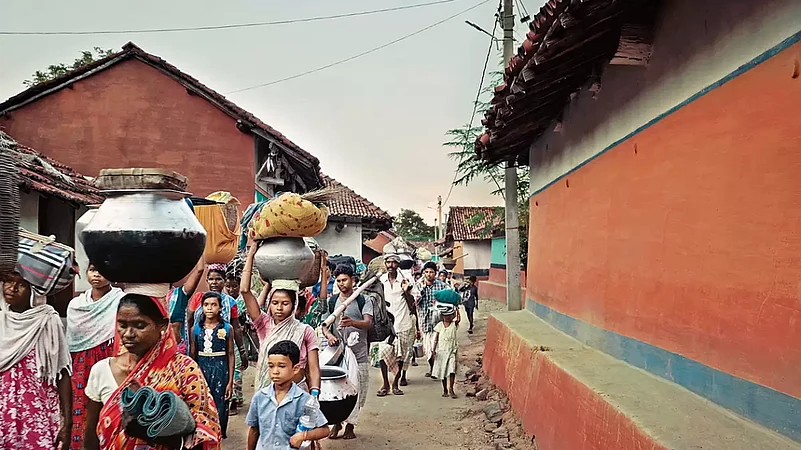My journey of making the film Tortoise Under the Earth began in 2019 when I came across Santal Folk Tales, a volume of three books by Paul Olaf Bodding, a Norwegian folklorist and linguist. He had served in India for 44 years from 1889-1933 and his documentation of the lives of the Santhals during this time influenced me a lot; I was riveted by their folk stories, culture, belief system, tradition and oral histories that have been passed down across generations.
However, when my research began with long journeys across remote parts of Jharkhand, I never expected to encounter the anxiety of dispossession, eviction and displacement. People who had worked in the region before me invariably spoke about mining and the adverse impact of ‘modern development’ that does not value indigenous ways of life. Yet there was a gap, more precisely, a cultural gap. How do dispossession and eviction impact their cultural lives? How do they reshape everyday engagement and social discourse?
I came to Jharkhand in search of poetry, wild animals from the folk stories, kasi flowers that bloomed in spring, the fragrance of the mahua flower, the golden, glittering Subarnarekha River, beats of the tamak and tunes on the tiryo. Instead, I saw an old man cycling kilometres with coal slabs collected from a passing train for a mere Rs 26. Illuminated by the headlight of my bike, a group of Santhal women cycled in a line, with gamchhas (cotton towels) slung around their necks. They went out searching for work to fulfil their responsibility towards their homes and families. The long hours and rigorous work followed by meagre wages was not enough to feed their families. A bulk of them live in a state of semi-starvation throughout the year. For industries and mining companies, however, the state of Jharkhand provides cheap labour. And this cheap labour works for ‘development’ and ‘profits’ that lead to the eviction of Adivasis from their jal, jangal and jameen (water, forest and land).
Since the 1980s, uranium mining has been going on in Jharkhand. While any ‘developmental project’ eventually ends up evicting Adivasis from their homes, uranium mining has several other adverse effects on their lives such as congenital deformities. At Jadugoda in East Singhbhum district, for many years, children were born deformed. However, most of the villages that the authorities call ‘developed’ are close to the mining sites. The added burden is the tailing pond which is a human-made pond where the waste from the mining site is disposed of. There are guidelines that say that such ponds should not be near residential areas in the neighbourhood. But, I never found any such rule to have been followed. Contaminated water and the threats of eviction are what Adivasis live with. We also saw that the old, traditional, thick-walled mud houses had made way for brick-walled ones which got awfully hot in the summers and are unsuitable to live in. Waste or refuse from the mining sites seeped into groundwater reserves, causing diseases. The herbal or plant-based medicines which came from the knowledge of nature have been replaced with allopathy.
While working in village Turamdih, around 10-12 km away from Jadugoda, we heard about police jeeps doing the rounds announcing the government policy of giving jobs in return for land that falls under proposed mining sites. However, we also heard people talking about the futility of such promises. When they had to leave their home, what else could matter?
There are several houses that had already been vacated when we reached there, with the paint on the walls still fresh, and the houses empty, as if waiting for their dwellers. Now they are not even allowed in their houses that were built by their grandparents. Some of the houses were completely demolished. We found people coming back to collect pieces from the debris of the houses to build a home again.
The protagonist, Jagannath Baskey, was living with the anxiety of being evicted; his uncle, whose family’s house had been taken away, still awaits a job. He was promised a job in return for his land but the long wait became a scar on his dispossessed life. I didn’t know how to console him in such a situation. I found little children helping him remove discarded materials from his previous house. However, even then, I could see Baskey’s uncle thinking about birds and their nests and what would happen to them.
Real development is when we grow together, carrying along our rooted culture and not at the cost of anything else. If we cut trees to clear ground for mining, then we are also responsible for re-planting them. We, humans, have greedily been taking from nature without giving back or considering that every living organism has an equal share. Since our lives are closely related to nature, any adverse impact on the environment will adversely affect our lives too. Excessive mining ruins the land, water, forests and air. The loss or pollution of natural resources degrades the quality of human life in these areas. Human beings are forced to disperse from their homeland. It is against human dignity. Heavy mining is done without any consideration for the rights of the tribal population. There is a parallel to be drawn between the vanishing forests (the traditional source of livelihood for the Adivasis) and the loss of their culture and traditions as more and more Santhals are forced to migrate to cities in search of work.
Even in this crisis, life moves on. On a moonlit night, I walked through the hills and the forest that were densely populated by Karam trees. Fireflies shone like stars in the undergrowth. Amidst the meditative cacophony of crickets and the fragrance of the wild flowers, there was no sense of fear of the dark or of the forest. I kept walking and arrived at a stretch of open land; the majestic and protective forests had disappeared, the trees had been harshly erased. The red soil covering the barren land looked like a blood-soaked wartime graveyard. A lamppost flickered by the side of a small, snake-like road, and gigantic iron pipes constantly poured black water into a manmade pond that smelled like rat poison. These gruesome sights filled my senses with more fear than any jungle or ghost could. I could not gather the courage to go on my nightly walk for the next few nights. My resolution, however, was finally broken on the night of Sohrai—the harvest festival—when my heart was filled with the beautiful voices of the Santhals, their rhythmic dancing a sight for sore eyes. They sang happily: the words if translated, say:
The koel bird atop the Dalma
Among the bushes and bough
Among the bushes and bough
The koel bird sings in woe
As the Phagun’s new leaves grow
Does the koel sing in woeful wonder
Or does she cry with hunger?
My film Tortoise Under The Earth taught me that cinema can be a medium to connect to people—to understand and realise the real issues of land and lives. I had let people, landscapes, politics and seasons participate in this process to the extent that finding a form and a story became an organic process for everyone involved. The docu-fiction format allowed me to retain the rawness, as most of the characters in the film were non-performers, playing themselves, as well as engaging with my craft, directing the story through subtle interventions. My process was the antithesis of all conventional ways of filmmaking. The experience taught me the pains of dispossession and eviction and left me with a question, that Utpal Dutta, the protagonist of Satyajit Ray’s film Agantuk, had asked: “What do you mean by ‘development’?”
(Views expressed are personal)
Shishir Jha is a writer, filmmaker and director of the 2022 feature film, Tortoise Under The Earth (Dharti Latar Re Horo)





















